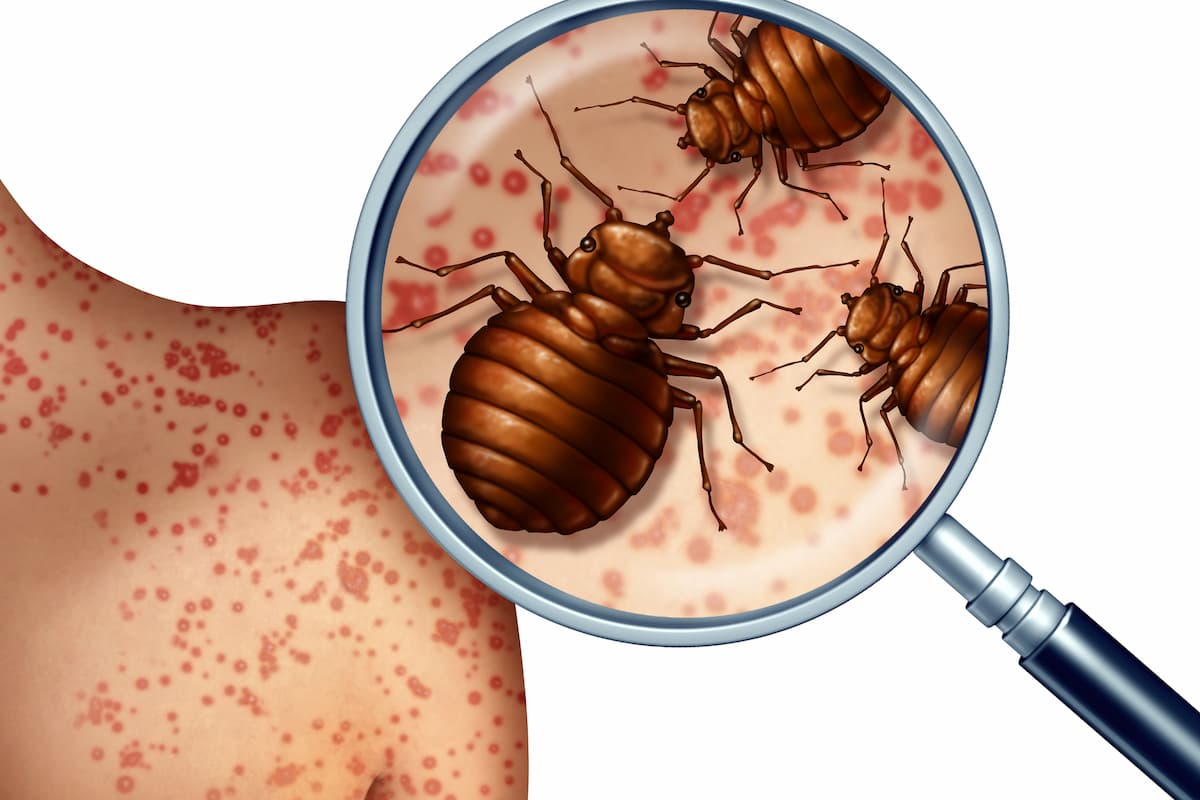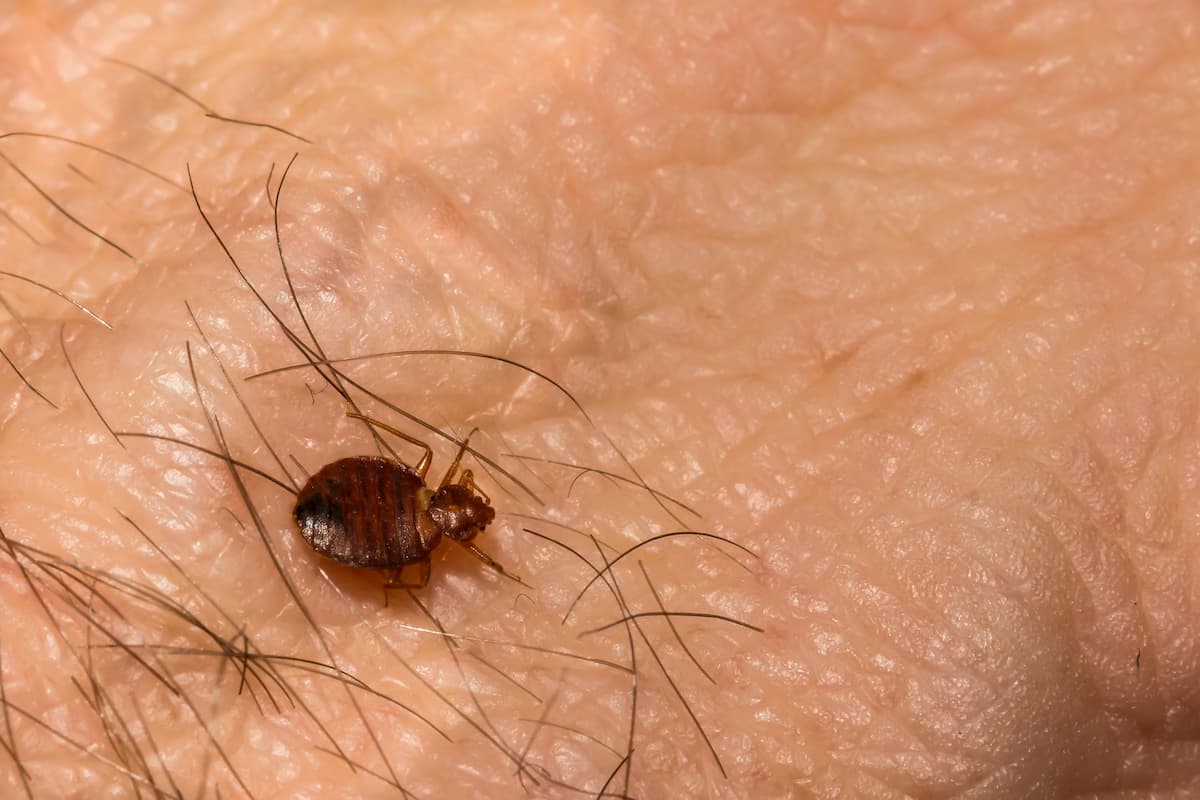Can Bed Bugs Go in Your Ear?
If you have bed bugs, one of the most pressing questions on your mind could be, can bed bugs get into my ear?
Yes, bed bugs can go in your ears. However, it is pretty rare for them to do so. Bed bugs just want to feed on you and get back to their hiding spot before you see them. Thus, they usually bite the first bit of exposed skin and leave.
Will a Bed Bug Go in My Ear?

Typically, a bed bug will not go in a person’s ear.
Bed bugs don’t want you to see them because it is dangerous for them to get spotted.
Thus, they usually just climb out of hiding and head for the first bit of skin they see, feed, and leave.
Yet, bed bugs can go into your ear if they want to do so.
However, if they try, you will probably wake up pretty quickly since the inside of the ear is sensitive.
What Should I Do if a Bed Bug Gets in My Ear?
If a bed bug gets into your ear, the first thing you want to do is see if you can get it to fall out.
To do this, just lean the affected ear toward the floor and shake your head.
If the bug falls out, you don’t need to do anything else unless you develop pain or infection in that ear.
If the bug does not come out, your next step is to try to determine if it is alive.
You can tell the bed bug is still alive if you feel movement.
And remember that you need to stay calm if you are accurately going to tell if the bug is still alive in there.
If you have determined that the bug is alive, pour a small amount of vegetable oil into your ear to suffocate it.
Then, once the bug is dead, you can gently try to flush it out of your ear using warm water.
If the bug doesn’t come out after performing these steps, you will need to go to the doctor so that they can remove it for you.
Never attempt to stick anything, like tweezers or even a cotton swab, into your ear if you can’t get the bug out.
These objects could push the insect further into your ear or damage the sensitive skin in your ear canal and lead to an infection.
Will a Bed Bug Go in My Mouth or Nose?

A bed bug may go in your mouth or nose, but, again, it isn’t likely.
Basically, they almost always won’t do so because there is no reason for them to attempt to when it’s easier for them to bite a more exposed bit of skin.
What Should I Do if I Swallow a Bed Bug?
If you swallowed a bed bug or believe you did, you don’t need to worry.
Although swallowing any insect is gross, your body will almost certainly pass it naturally.
What Should I Do if a Bed Bug Goes in My Nose?
In most cases, if a bed bug goes into your nose, you can get it out by covering your other nostril and blowing.
However, if that doesn’t work, you may need a doctor to remove it for you.
You should also go to the doctor if you removed the bug, but you experience a bloody nose that won’t cease, have persistent pain, or develop signs of an infection.
Will a Bed Bug Go in My Hair?
A bed bug could go in your hair if it wanted to do so.
But bed bugs don’t really like hair.
A bed bug is pretty tiny, only about the size of an apple seed, so navigating over or through hair can be challenging.
They also like to bite smooth skin.
Therefore, it is not likely that they will crawl around in your hair.
Do Bed Bugs Live on People?

No, bed bugs do not live on people.
A bed bug’s favorite place to live is on objects that humans frequently sit or sleep on, such as a bed, couch, or recliner.
Thus, you won’t have to worry about bed bugs living on your skin in the same way lice do.
Additionally, bed bugs do not latch onto a person’s skin like a tick does.
Bed bugs instead come out during the night and feed on their host when they’re sleeping, using a tube-like beak that looks like the ones mosquitos have.
However, a bed bug could hold onto your clothes and travel around with you for a time.
Yet, they don’t like to stay on people for longer than they have to, meaning they’ll probably crawl off of you as soon as they can.
But, since they can hold onto you, you could bring them to other places.
In fact, holding onto humans or going into people’s bags are the primary way that bed bugs spread.
Where Can Bed Bugs Live?
As I said, bed bugs prefer to live inside furniture that people sit or lay on for extended periods.
However, bed bugs can live just about anywhere.
Some other common places to find bed bugs include:
- In the folds of curtains
- Inside drawers, particularly in drawer joints
- In wallpaper
- In cracks in the walls, ceiling, or floor
- In the carpet
- Under posters and paintings
- In bus, train, and plane seats
- In piles of clothes
- On stuffed animals
Will I Be Able to Feel Bed Bugs Crawling on Me?

If you’re awake, there’s a good chance you will feel the bed bug crawling on you.
When you’re sleeping, though, you probably won’t wake up if a bed bug walks on you because they’re so small.
Additionally, you should be aware that it’s pretty common for people who have bed bugs or who recently had them to feel insects crawling on them when they aren’t.
This feeling can be distressing, but it typically disappears when the bed bugs have been gone for a while.
Will I Be Able to See the Bed Bugs?
Yes, humans can see bed bugs.
They’re pretty small, though, as they’re about the size of an apple seed.
However, even their eggs and babies are large enough to see, but you may have to look harder to spot them than you would for an adult bed bug.
Can Bed Bugs Get on My Pets?

Bed bugs prefer to feed on humans, but they can eat the blood of any warm-blooded animal.
Thus, bed bugs might feed on certain pets, like birds, cats, dogs, rabbits, and hamsters.
But, bed bugs do not live on these animals like fleas.
Instead, they eat from them just as they do humans, by feeding as quickly as possible and then leaving.
Yet, you can rest assured that cold-blooded pets, which include reptiles, fish, amphibians, and other insects, will not have to worry about bed bugs because they won’t drink their blood.
Conclusion
Generally, bed bugs will not go in your ears, mouth, or nose.
However, they can get into these areas if they want to do so.
Bed bugs may also travel through your hair if they feel inclined, but they don’t typically want to move around on a hairy scalp.
Table of Contents
- Will a Bed Bug Go in My Ear?
- What Should I Do if a Bed Bug Gets in My Ear?
- Will a Bed Bug Go in My Mouth or Nose?
- Will a Bed Bug Go in My Hair?
- Do Bed Bugs Live on People?
- Where Can Bed Bugs Live?
- Will I Be Able to Feel Bed Bugs Crawling on Me?
- Will I Be Able to See the Bed Bugs?
- Can Bed Bugs Get on My Pets?
- Conclusion
